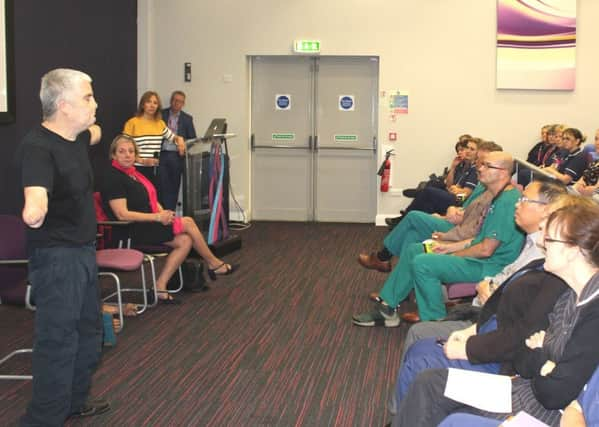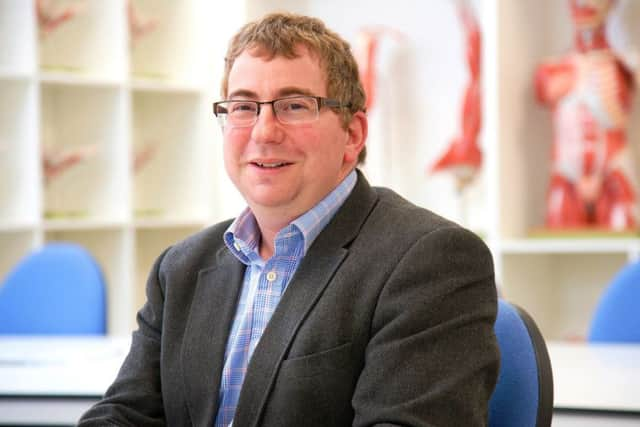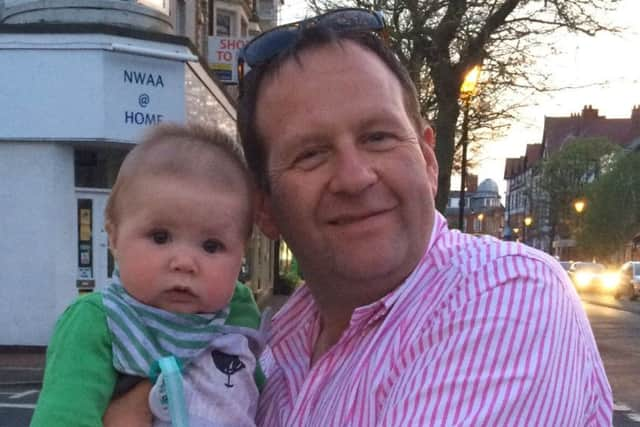Vic boss admits more must be done to stop sepsis deaths after talk by survivor Tom Ray


Professor Morris Gordon’s comments came after a talk from survivor Tom Ray, who had his lower arms and lower legs amputated – and also suffered damage to his face – after contracting the deadly infection elsewhere in 1999.
He visited the hospital with his wife Nicola to talk about their experiences of the condition, which is a serious complication of an infection and, without urgent treatment, leads to multiple organ failure and death.
It kills 44,000 people in the UK every year.


Advertisement
Hide AdAdvertisement
Hide AdProf Morris said: “As healthcare professionals, we sometimes focus on pathways and targets, but days like this show just what sepsis means to individuals, and humanises the issue, and there was a real tone of admiration and respect from everyone in the room for what Tom and Nicola have achieved.
“Tom said 44,000 deaths a year through sepsis cannot be right, and we must put ourselves in a position where we think every one of those deaths is preventable, and we can’t rest until we do that.”
Mr Ray said he was left for 12 hours without treatment, with his body turning black and his hands and feet dying.
He said doctors “gave me the impression I was a one-off”, but said: “It turns out it is actually one of the most common causes of major illness prevalent in hospitals today.”


Advertisement
Hide AdAdvertisement
Hide AdMrs Ray said medics need to consider sepsis – and treatment – quicker.
The Vic was recently criticised after the death of Paul Wilkinson, 45, who died from sepsis after being admitted with stomach pain.
His inquest heard simple antibiotics may have saved his life.
The salesman, from Lytham, had a fever and a fast heart rate – both warning signs of sepsis – but there was “no evidence this was acknowledged or acted upon,” independent expert Dr Christopher Gibbins told the court.


Advertisement
Hide AdAdvertisement
Hide AdHe was also given steroids, despite a junior doctor warning against it, which may have masked inflammation, another sign of infection.
Medical director Prof Mark O’Donnell said “a number of actions” were “implemented” after Mr Wilkinson’s death, and said: “As a consequence of these actions and work we were already undertaking, we have seen significant improvements in the care of patients treated for sepsis in the trust.”
Mrs Ray told healthcare workers who attended the talk: “The over-arching message we want everybody to leave with is that, when they have a sick person in front of them and they are not entirely sure what is going on, they just have to ask themselves: ‘Could it be sepsis?’
“If they do suspect it is sepsis, then the quicker you start antibiotics, oxygen, and fluids, then the greater the chances are that you can halt it.
Advertisement
Hide AdAdvertisement
Hide Ad“It doesn’t require massive intervention, but it does need to be done as quickly as possible.”
Mr and Mrs Ray, from the East Midlands, have made countless TV. Their story was published in a book called ‘Starfish’ and, in 2016, was turned into a film of the same name.